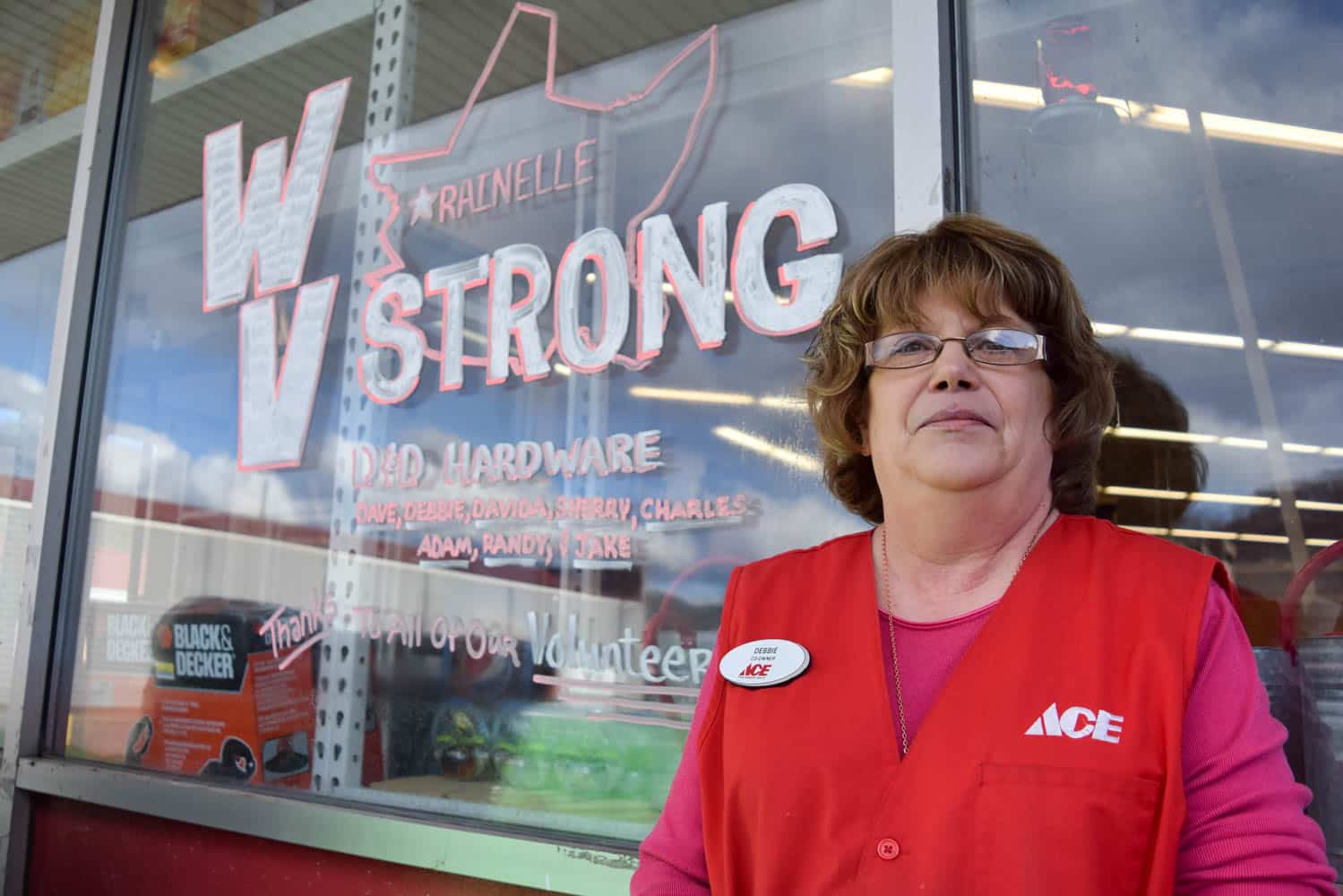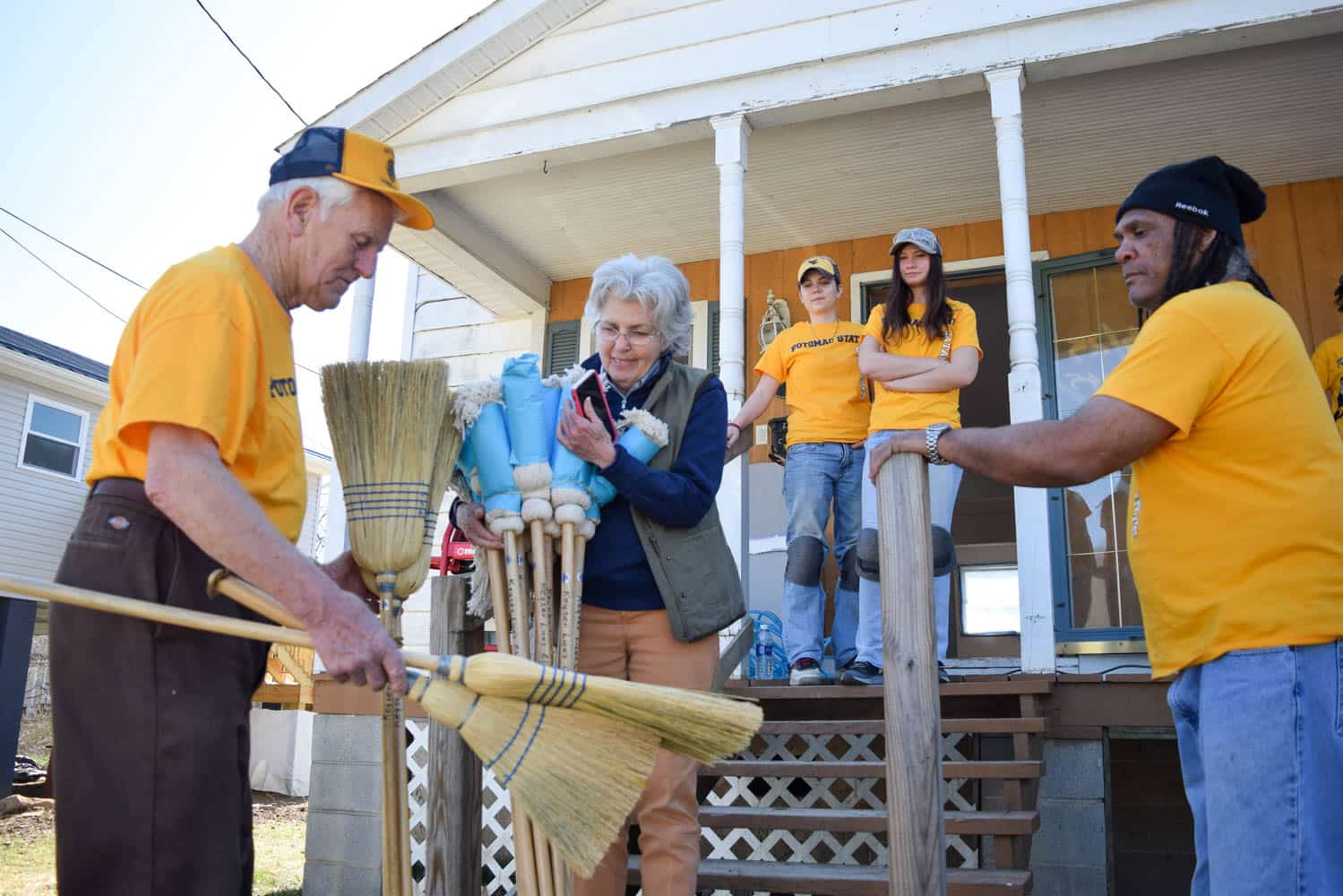Part 3 of 4: Remembering the Flood
On June 23, 2016 flood tore through southern West Virginia killing 23 people, four in Rainelle.
Many escaped with their lives, but not without coming close to death or losing almost everything they owned. Some people were trapped in their flooded homes in downtown Rainelle, forced to wait out the whole night or longer on their top floors, while others made it out on their own in the nick of time.
Now months later, some such as Becky Gilkeson and the Pearl and Brian Day family are in completely new homes, while others like Doreen Goddard and Helen Ripley have had major repair done to their original homes. While the flood recovery presented many new opportunities and restored peace, no amount of donations can bring back the lives that were lost.
The survivors tell their stories:
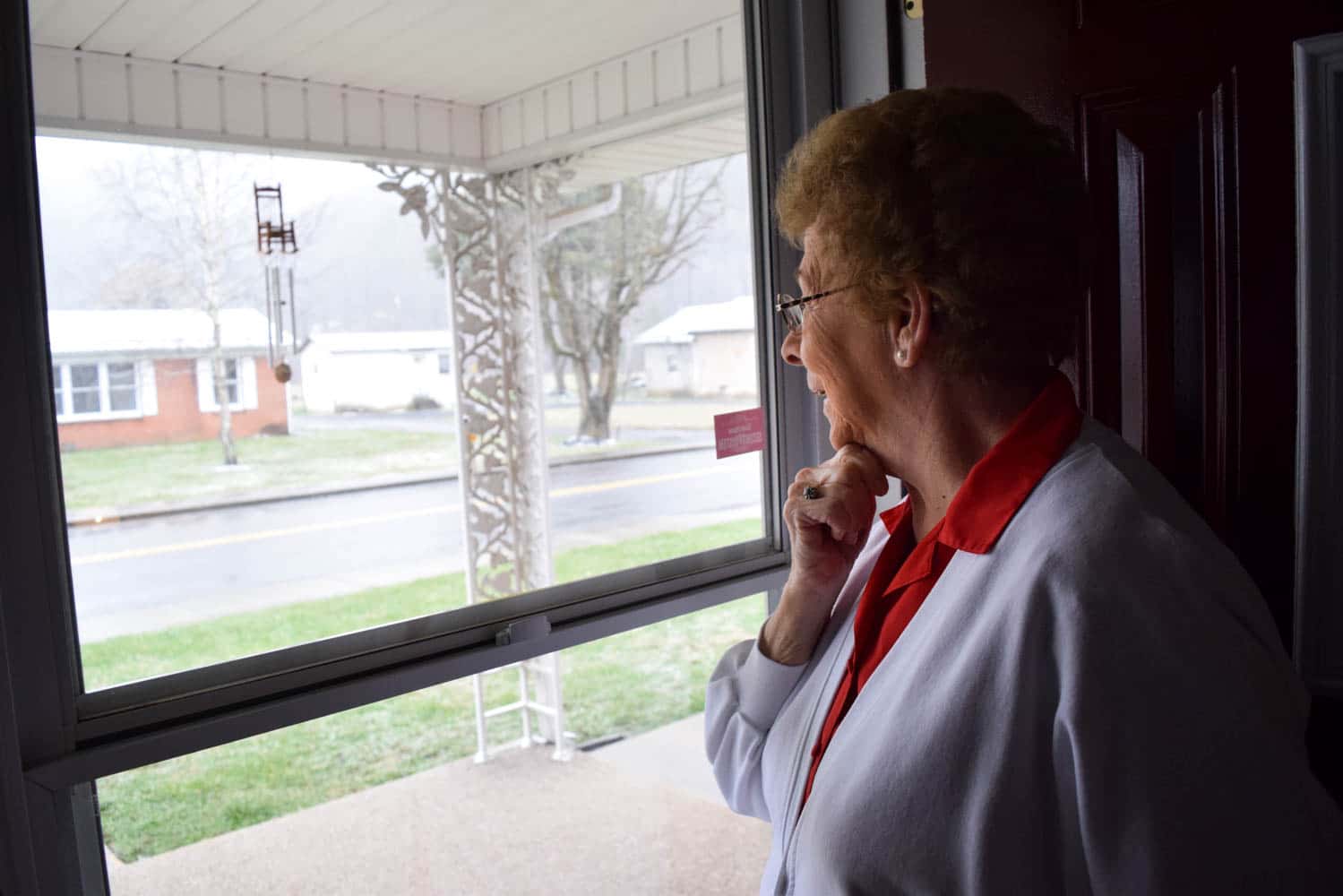
“It was up against the back of my neck, and I kept saying, ‘Dear Lord, have you forgot me?’ ” — Helen Ripley
Ripley never had water in her home or in her garage. When she saw the rain picking up that day, she didn’t have any reason to believe it would come up any farther than the driveway.
“Even before it got real, real dark, you kept thinking the water will cease. The water did not cease. Little did we know. It’s been bad before, but not like that and not right here in our area,” Helen Ripley said.
Eighty-year-old Helen Ripley watched at her front door.
Water rose up through the towels she had stuff under the door crack. All of her furniture in the living room turned over in the swift, yellow, muddy water. She stood shivering in water for two and a half hours, waiting for the water to crest. It rose from her knees, to her chest, to the base of her neck. It was five feet in her house.
Across the street, Ripley could barely see and hear Fred Fryer, pastor of Sewell Valley Baptist Church, and his wife shouting from their front porch. As it got dark, they used flashlights to signal each other.
“I kept thinking, surely somebody will come. And Pastor Fred kept telling me, ‘if we get out, you’ll get out.’ So that was my only hope, with Pastor Fred and Cathy,” Ripley said.
Two young boys in a boat pulled up to Ripley’s house and lifted her out of the water to safety. After getting the Fryers, they rode the boat up to higher ground where a member of the pastor’s church met them with blankets and brought everyone to his house in Springdale where they spent the night, received clean clothes, took showers and ate warm food.
The next day, Ripley’s brother Sam checked in on her house. The water was still up past his waist. He turned off the breaker and found one item untouched by water – Ripley’s pocketbook.
For the first two days of recovery, Ripley sat in her brother’s truck while he and others removed all of the destroyed furniture from her house and put it outside on the curb. She lost every piece of furniture in her one-story home, from her grandmother’s table to wooden pieces from Meadow River Lumber Company to old pictures of her family.
Though she only moved into this home in 2013, Ripley lived most of her life in Rainelle. She worked at Meadow River Lumber Company for 13 years until it closed.
With the help of her brother and fellow members of Rainelle United Methodist Church, Ripley’s home was completely repaired and ready for her to live in again by November.
“I’m so thankful I didn’t give up, because that keeps running through your mind, and you think everything’s gone, so why try to keep going? I guess I love life.”
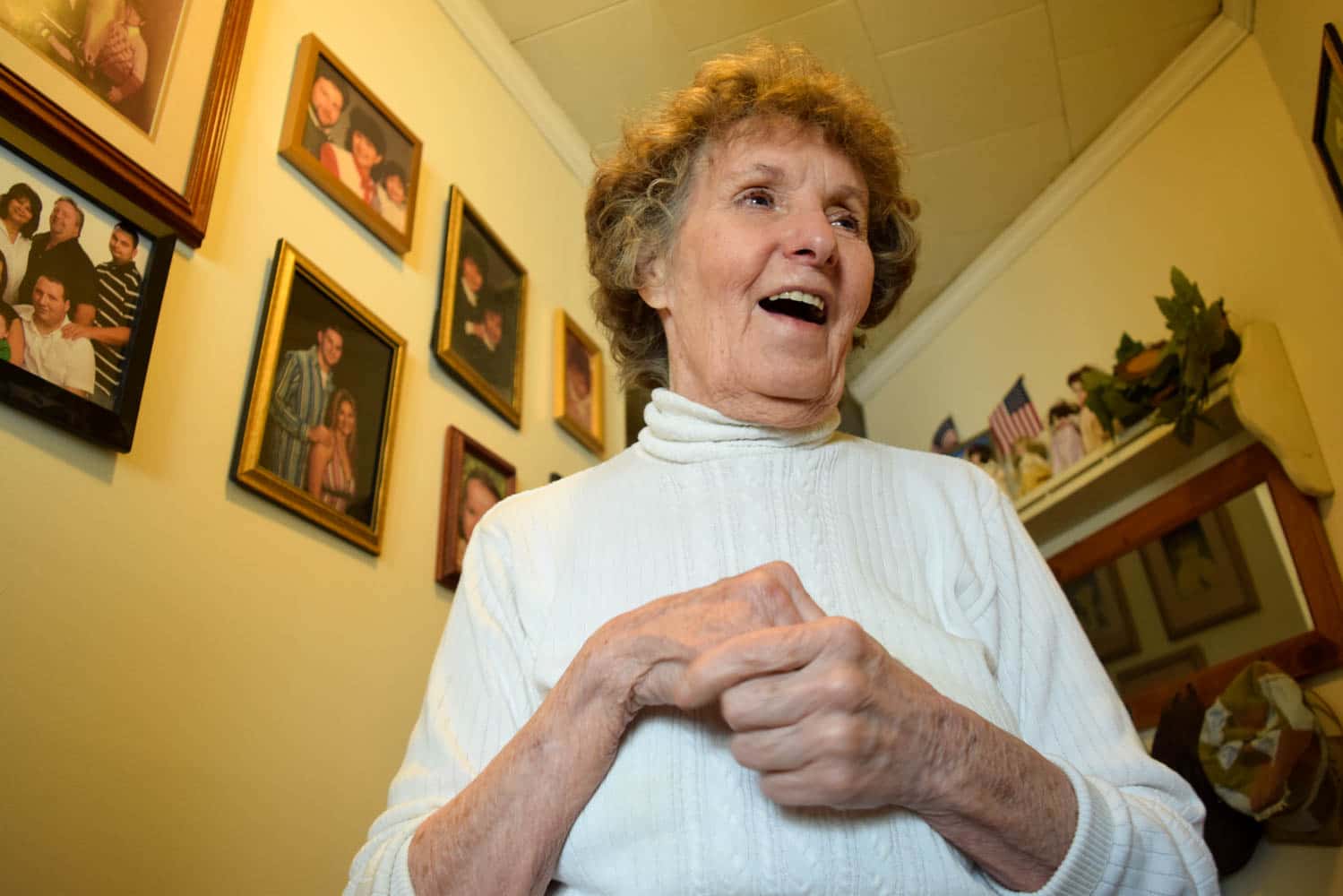
“Every day, I slept on the floor for a long time. And then somebody brought me an army cot. And then my brother brought me mattresses. You do what you can, and you don’t sit around and fret about what you can’t do.” — Doreen Goddard
Early on June 23, Doreen Goddard got a call from her cousin who lives in town, saying that some neighbors were already leaving their homes and that she should think about leaving too. But Goddard didn’t have water in her yard, so she didn’t leave.
Around 6 p.m., the rain picked up. She saw the twin chairs in her living room and knew she didn’t want those to get wet. Her late husband, Eddie, always said he wanted to die in West Virginia, and he died in one of those chairs after a long battle with cancer. So she moved those chairs and his old radio console away from the door to the kitchen where it seemed they wouldn’t get wet. Then she got a book, went upstairs, and went to bed.
Goddard awoke to the sound of people yelling outside at 9 p.m. Rescue trucks were already driving outside as the water was up to her second step outside.
She checked again at 11 p.m. and saw that the water outside had risen over the top of her picket fence. Her kitchen had water in it. The trucks were no longer going by.
“I heard somebody, it sounded like logs hitting my house, and that was my nephew,” she said. “He was with the fire department and they were trying to pound on my house and get me to come out. They couldn’t have opened the door because there was too much water pressure on it. It was way up out there. And I thought it was just logs. So I got me a trash can and started bailing water from my bathtub. Now he told me that didn’t do any good, but it did. I did it till 4:30 in the morning when I could not lift another bucket full. And I thought, well, if it’s my time to go, that’s fine. I’ll see Eddie, it won’t be anymore waiting,” Goddard said.
She curled up in bed under her sopping wet blankets and went fast to sleep until 7:30. She woke up, bailed more water, and saw it had stopped raining. Her nephew came back to the door after the water went down a bit and got Goddard out.
“I wasn’t scared. I knew that whatever happened, it was God’s will. And I did not worry about it,” she said.
The National Guard came by and told her she couldn’t stay in her house anymore, so she stayed at her nephew’s house in Meadow Bridge for the next few days. She came back to her home every day to work on it.
She would wake up at 3 every morning to shovel mud out and clean up the place. Besides her brief nap every day at noon, Goddard, at 78 years old with two artificial heart valves and rheumatoid arthritis, did not take a break. But she did not accomplish repairing her entire home on her own.
By the Monday after the flood, a truck of volunteers pulled up in front of Goddard’s house and helped her get furniture out of the house. One of the volunteers pulled Goddard aside and asked if she could pray for her. The volunteer had never spoken with Goddard and prayed for the three things Goddard needed: her energy level, her heart, and her joints. For the next few months, she was well enough to keep working and felt no pain in her body.
“I never saw her again, but I felt like God sent an angel to me,” she said.
Goddard’s father was a preacher when she was little. She always thought God cared for her only because of her dad’s position in leading their church. “But it seemed like God said to me one day in my heart, ‘Doreen!’ and I just thought, I’m his child. God has a plan for every one of us and we don’t know it because most of us don’t ask him what his plan is. But he has a plan, and for me, you can be a nobody in the world’s eyes, but God has a plan for you. God knew about this flood before we ever even suspected it.”
In 2010, Goddard saw an advertisement for the house on the Internet. HUD was planning to tear it down because of its age, being built in the 1940s. She bid on it without telling her husband. When she told him they got the house, he didn’t sleep a wink that night.
“Before he died though, he said, ‘I like that house better than any place we’ve ever lived,’ ” she recalled.
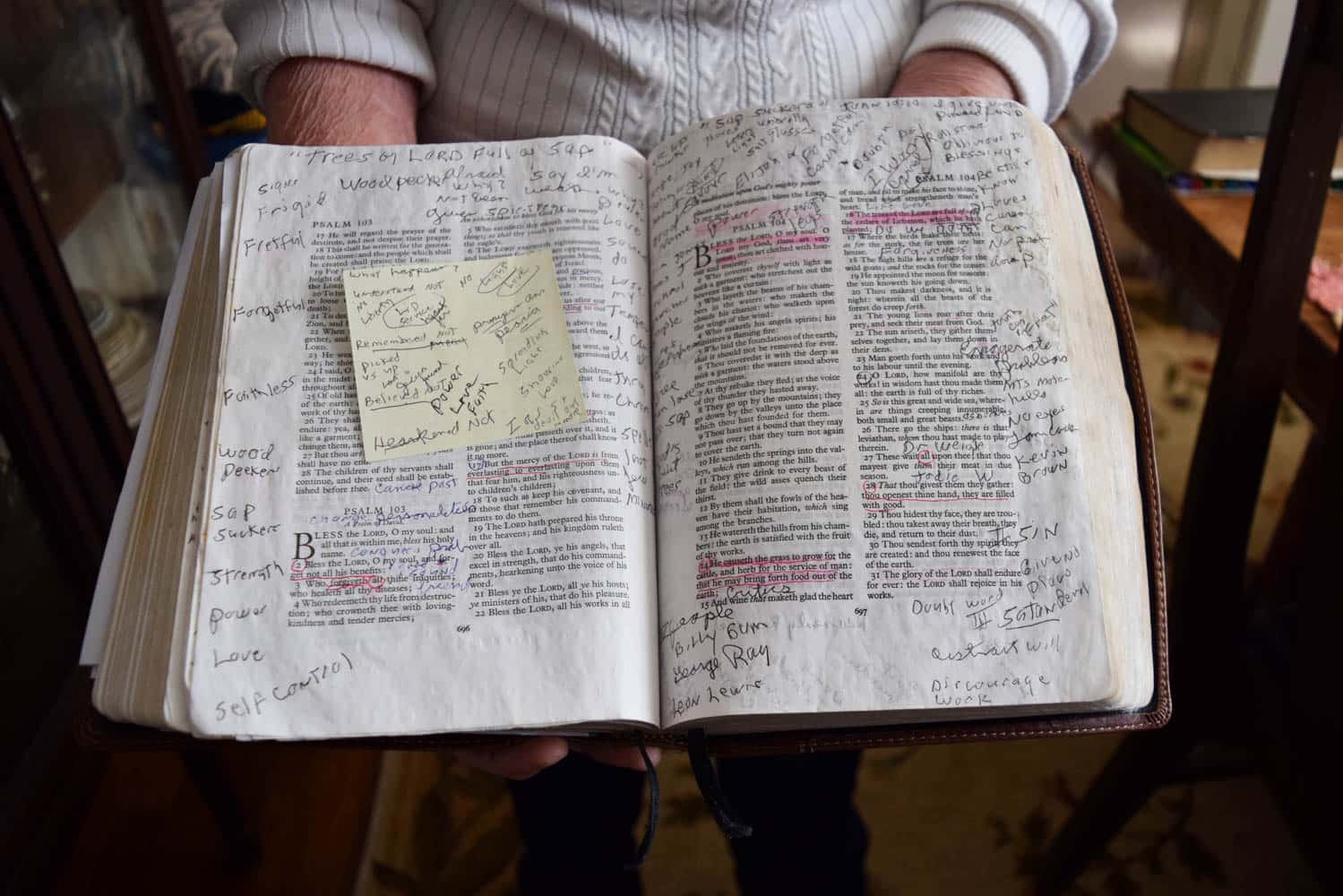
Her husband served as a preacher for most of his life. She listens over and over again to recordings of his later sermons on the television in her home. He owned over 8,000 books, most of which Goddard donated to other pastors after he died. She kept his study Bible — every page is covered in his handwritten notes.
She still finds mud in her house, in the crevices of the baseboards or some pieces of furniture that survived the water, and she still realizes she’s missing certain things she lost in the flood.
“Things you never think of, like your hair dryer, your curlers, your littler mixers, your can openers. Everything that was in that water is gone. And you think, how am I ever going to get all of this stuff replaced? But some of it’s fine, you didn’t need it anyway. I haven’t used a hair dryer since the flood.”
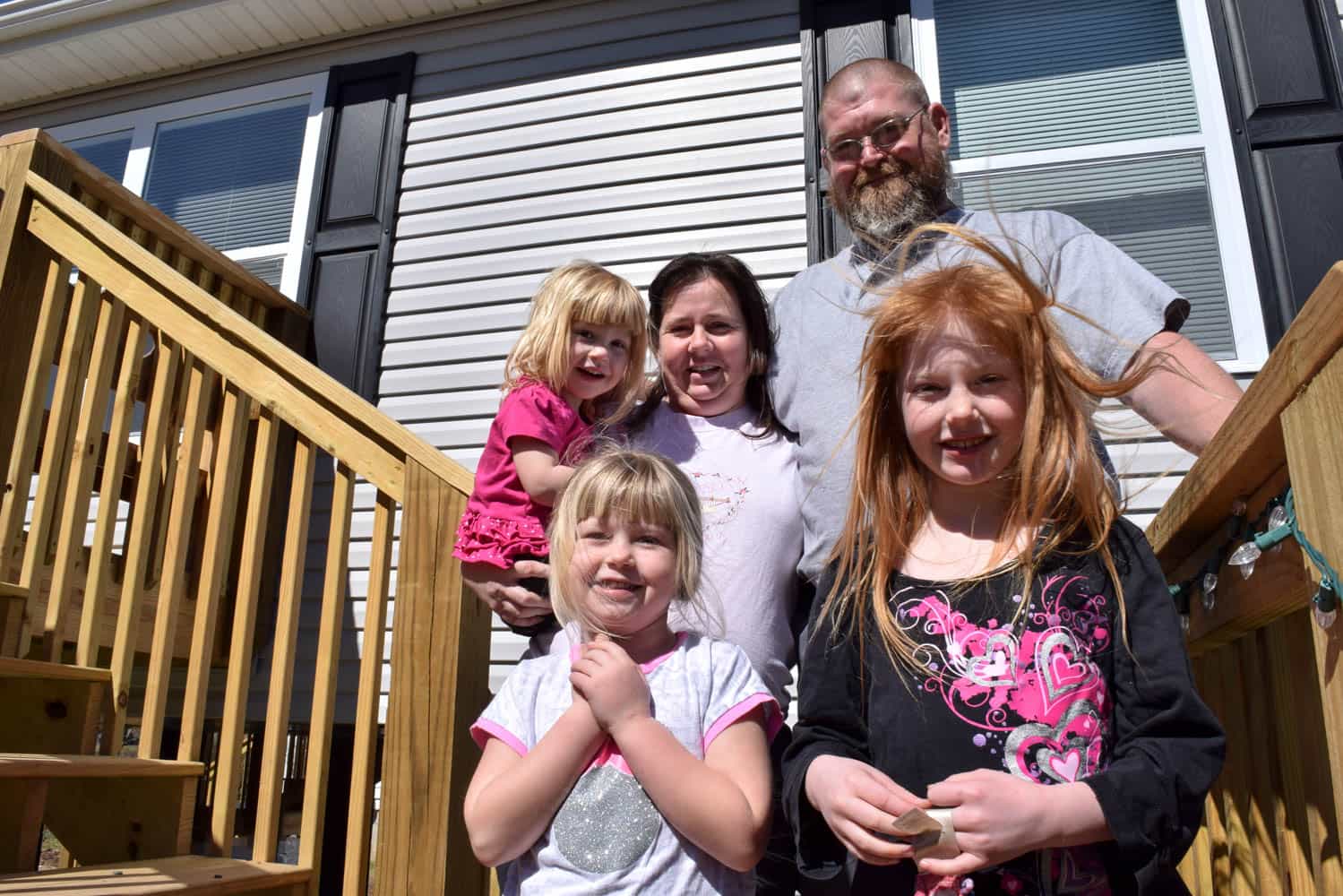
” ‘Rain cannot hurt you, rain cannot hurt you.’ And once it starts, I take deep breaths. One time the power went out at school. Everybody screamed, and I was like, ‘breathe in, breathe out.’ ” – Kaylee Day
On the day of the flood, Pearl Day was home with her girls, Kaylee, Kendal and Kristina, while her husband Brian was out at work.
Her oldest daughter, Kaylee, 7, looked outside and saw wooden beams from their neighbor’s yard floating in a few inches of water toward their own house.
Kaylee asked her mom if they were going to be okay, and Pearl said there was a chance they could get water in the house.
Pearl called Brian and said there was just a bit of water near the house, and he said to take a few minutes and pack some things in case they need to leave.
Five minutes later, Pearl looked outside again and the water was completely surrounding the house. On the phone, Brian told her to get the kids and leave the house. Pearl relied on Kaylee, the oldest, to watch the younger ones while she was packing.
The Days lost one of their dogs, Princess, a beagle and shitzu mix, in the flood. Princess was trapped underneath the outbuilding, and she wasn’t able to swim out from under it in time.
Pearl and her three daughters left the house before any water got in. A neighbor helped carry the girls out to their car because the water outside was up to Pearl’s waist.
The Days moved into that home in downtown Rainelle in 2005, and they have been flooded before. In 2010, the water rose up to the door like it had until this point in the June 2016 flood, so they figured they would be okay to come back to the house later.
They did not predict their house to have four feet of water.
Meanwhile, Brian Day drove all the way home from the first day of his job in North Carolina. He got to the house after the girls had already left, but he was able to go through the house and grab any last minute needed items for the family.
Brian met the girls at higher ground near Magic Mart where a temporary shelter had been set up. They stayed there that night and then moved in with Brian’s mother in Meadow Bridge for five months.
“Seeing the kids’ toys, some of it didn’t even look like it was ruined but you knew well that it was,” Pearl Day said. “It’s like a dirty stuffed animal but you know the water had been on it and it was more than just dirt, you couldn’t just throw it in the washer.”
The first few days after the flood, some friends helped the Days muck the house and remove everything from it. Piles of items destroyed by the flood sat outside the house.
“The hardest part for me was throwing out their clothes that I knew were their favorites,” Brian said.
Going back to school in the fall was extremely trying for Kaylee. She struggled every time it rained and she was separated from her mom. A school counselor helped her cope with separation anxiety and her fear of the rain, and then she was able to enjoy the rest of the school year.
The Days met with Walter Crouch of the Appalachia Service Project on August 25 to discuss the possibility of receiving a brand new home. Mayor Andy Pendleton and the town of Rainelle donated the lot, right down the street from where the Days used to live.
Two days after the Days moved in, the Days celebrated their first Thanksgiving meal in the new house.
“Once I saw the new house, I thought ‘I want my old house back.’ But now I like the new house,” Kaylee said.
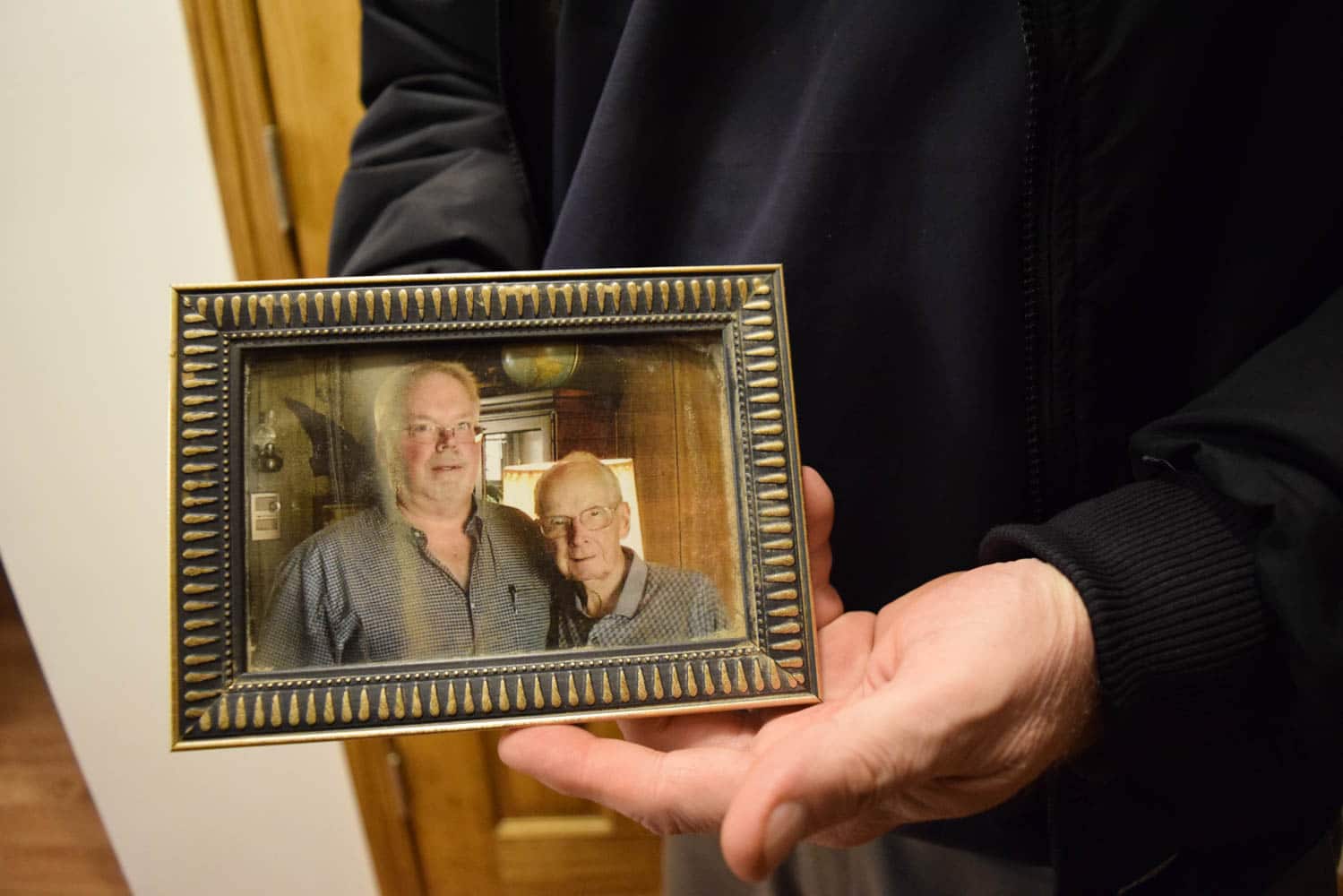
“There are things in life that’s a lot easier to do than that…I had to tell my mother that my dad and her husband of 65 years didn’t make it.” – Keith Thompson
An hour and a half south of his hometown of Rainelle, Keith Thompson was driving through Beckley with his wife as the rain came down harder and harder.
His parents, Edward and Gerda Thompson, were still in their house in downtown Rainelle. They were ready to go to bed for the night, but before they knew it, they were standing in water in their living room.
Waiting for help to arrive, they sat on their couch right behind the front window. Outside, submerged in water, was the Thompsons’ car, where Edward Thompson would sit inside to listen to his son call baseball games on the local radio station.
They talked to their son on the phone as the water quickly rose, but Keith Thompson, waiting out the storm in Beckley, lost contact with his parents around 7:30 p.m..
Around midnight, he called up his friend George Brooks at the Rainelle Fire Department and asked if it was possible for the rescuers to check on his parents’ house.
“I knew I could not get to Rainelle, and if I did, there was absolutely nothing I could do. So I said, whatever happens over there, I can live with that. And a peace overcame me like I’ve never had in my life,” Keith Thompson said.
Close to four feet of water filled the one-story house. Edward and Gerda Thompson were stuck in the water for more than five hours.
By 2 a.m., Brooks called Keith Thompson and said they rescued his mom on a boat and were taking her to the hospital.
Keith Thompson then learned that his dad did not make it.
“It could have been 90 degrees in this little town and not a rain cloud for 400 miles out here, and my dad would have left this earth at that time because it was his time to go,” Keith Thompson said.
But there wasn’t time to grieve yet; Keith Thompson had to get to his mother at the Summersville Hospital. He and his wife drove up from Beckley and got a flat tire on the way, but they arrived at the hospital around 3:30 in the morning.
Keith Thompson asked the nurse if his mom knew that his dad had passed away. The nurse said she didn’t think so.
“There are things in life that’s a lot easier to do than that,” he said. “I had to tell my mother that my dad and her husband of 65 years didn’t make it.”
Keith Thompson learned from his mother that, while they were waiting for help to come, Edward Thompson laid his head on Gerda Thompson’s shoulder, and she said something to him. He did not respond.
The rescue boat nearly passed by the house because when they looked through the window, they couldn’t see or hear anyone inside. But as the boat was ready to leave, one of the rescuers saw the curtain move inside. They had to break through the front window to get to Keith Thompson’s parents.
Gerda Thompson’s body temperature was 88 degrees when she arrived at the hospital, even after a long, warm ambulance ride.
“My mother should not have made it out of this house. It was not her time,” Keith Thompson said.
In the following months after the flood, the Thompsons’ house in Rainelle received all new flooring, duct work, walls, windows and furnishing. Gerda Thompson moved back in October. She spent the last month of her life in the restored version of her lifelong home. In October she died from a stroke.
“My mother always said, ‘I want to live one day longer than your dad, because no one will take care of him like I do.’ And we’ve got the place rebuilt, and my mother came back here to stay. So she fulfilled her mission, and she went home,” Keith Thompson said.
Edward Thompson was 85 when he died just after midnight on June 24. Gerda Thompson was 83 when she died on October 28.
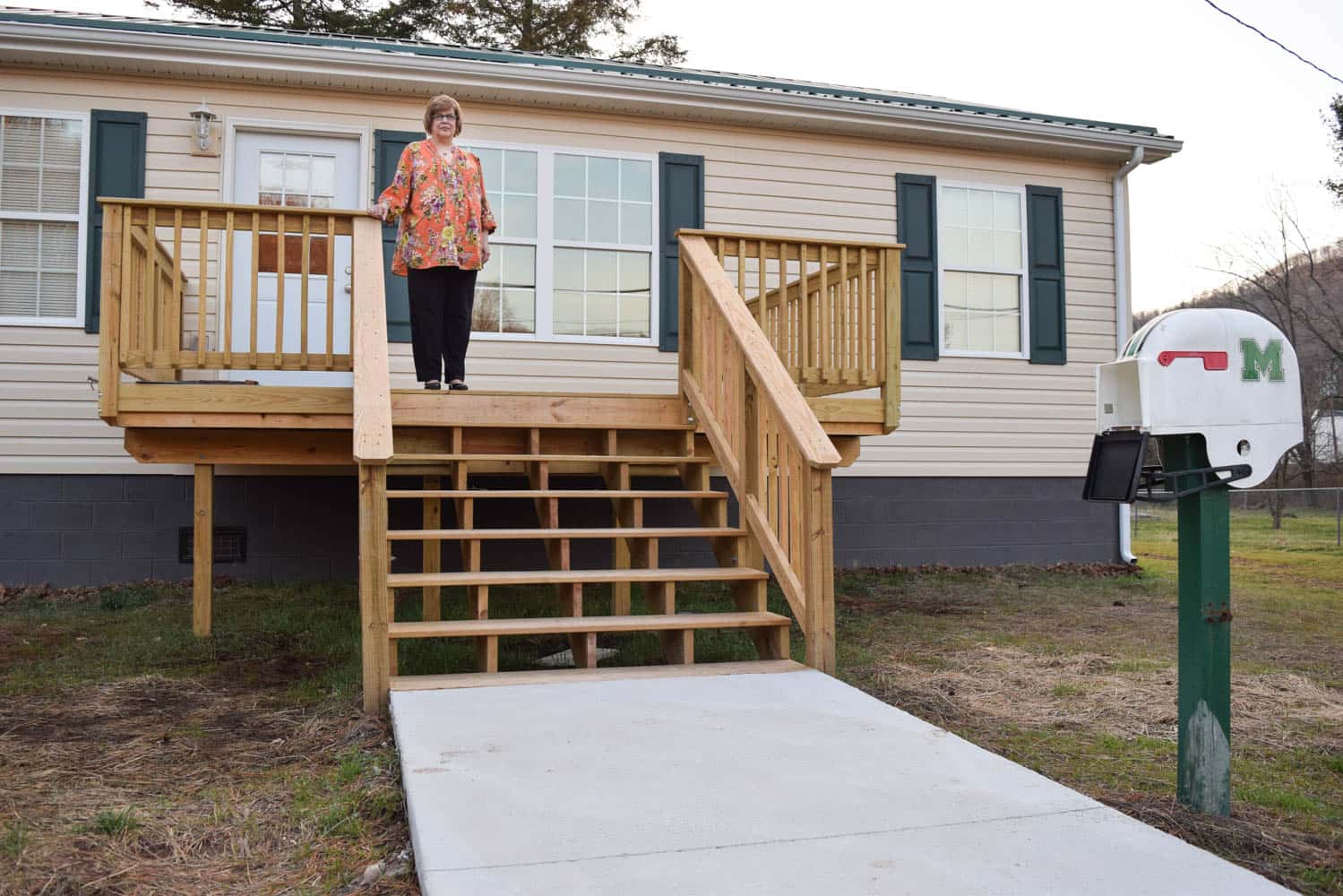
“I will go to my grave believing that the flood killed Russ. The depression and the worry and the wondering. He blamed himself. He kept saying, ‘it’s my fault, it’s my fault.’ I’d say ‘a flood is not your fault.’ ” — Becky Gilkeson
Out of all the families in Rainelle who needed new homes after the June 23 flood, the Russ and Becky Gilkeson were chosen to receive the first new home. On October 14, Greenbrier West High School’s marching band played the front yard with their neighbors, their church family and their students watching as they took ownership of their new home. It was the first of more than 70 homes built by Appalachia Service Project, a nonprofit based out of Tennessee that builds or repairs houses for people in central Appalachia affected by natural disaster and poverty.
Russ Gilkeson coached several sports teams – girls’ soccer and softball – at Greenbrier West. Since the flood destroyed their home, he had been commuting every day from their temporary living arrangements an hour out of town to get to practice at the high school.
The night of the celebration, “We stopped here at the house, we stood right there, and he said, ‘This is the house I always wanted to give you,’ ” Becky Gilkeson recalled of her husband.
That evening, they went back to their temporary home in Middle Creek for the weekend before getting ready to move in Monday morning. They went to church on Sunday. At home that afternoon Russ said he was going to lay down in the next room. Becky called in to check on Russ a few times and he said he was okay – until the third time, when he slurred his words. Becky ran into his room, but he was already gone.
The death certificate said heart attack. Becky thinks he had a stroke, too.
“He passed away, and we never got to sleep a night in [the new house]. I think it’s better in a way that he didn’t, because I don’t know if I could have slept in that bed without him,” she said.
Russ, originally from Rainelle, and Becky, originally from Charleston, worked together at Rainelle Junior High when they met. Each of them had been married before. After Becky and her first husband separated, Russ mentioned to another teacher that he wanted to ask Becky out. She said she was interested, so they went on their first date to see Garth Brooks at the state fair.
“He kept saying all night, ‘Are we having fun yet? Are we having fun yet?’ ” she recalled.
The two lived a few blocks from one another in Rainelle. Russ would come over to Becky’s apartment and stay there till 2 a.m., but he would never spend the night because he didn’t want any students to know.
They went to Marshall University for their masters degrees in athletic training.
“We drove around all the time with the skeleton. I would quiz him on the bones and all that. His name was Fred. We drove around with Fred in the car all the time,” she said.
Two years later, they went to Virginia where Becky’s daughter was living, and they got married by the Justice of the Peace with only a few family members surrounding them.
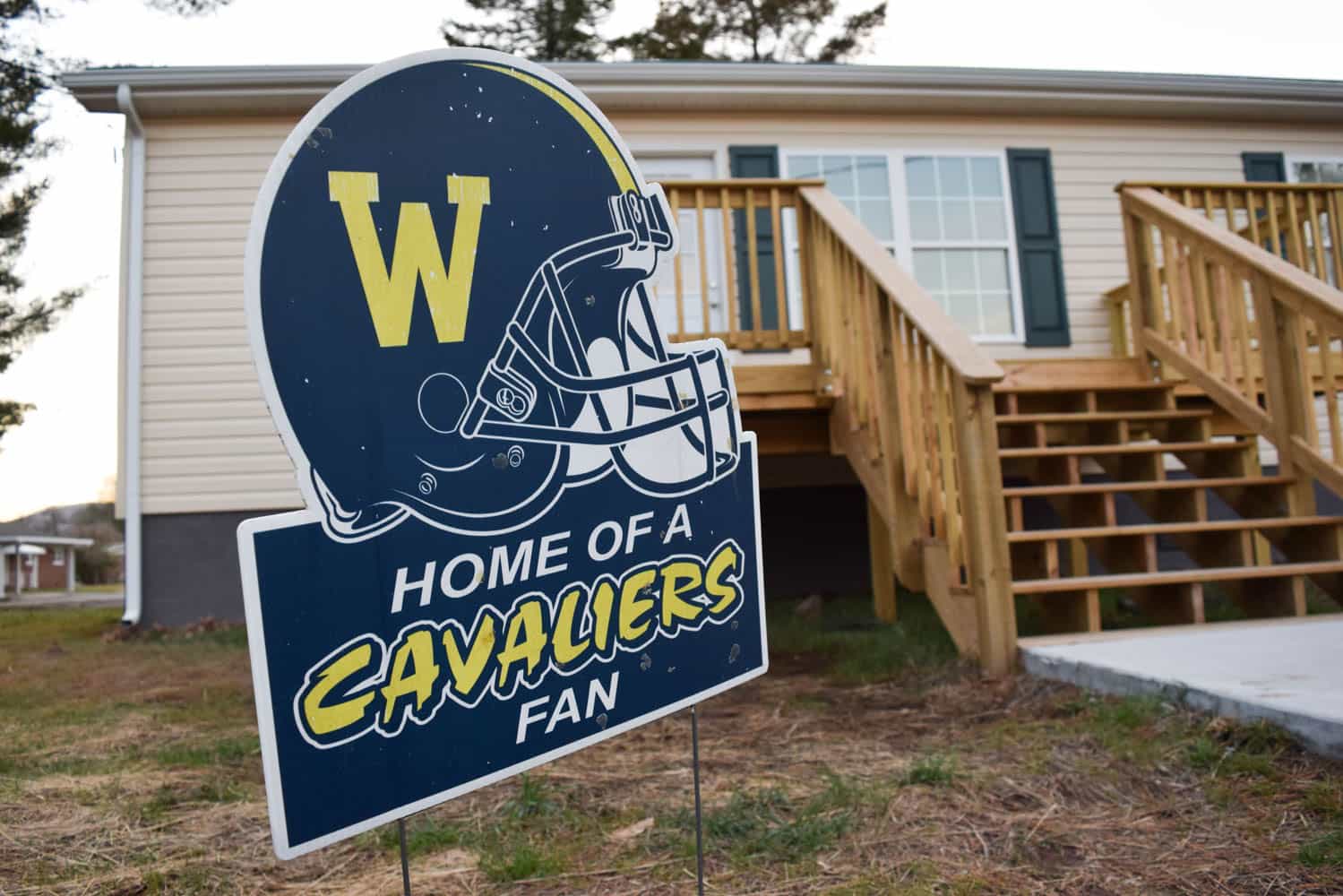
“I don’t think either one of us ever said, ‘will you marry me?’ ” she recalled, “we got married for companionship. Then it turned into this huge love. We fell more and more in love, especially after we were retired and we were together all the time. We had so many plans of places where we were going to go and things we wanted to do. And now I feel like a fifth wheel. Everybody, all my friends, have partners.”
When Russ and Becky saw water coming into their house, they moved up to the second floor. When rescuers found out the Gilkesons were trapped upstairs, Russ said to take care of others who needed immediate help before worrying about him and Becky. Neighbors would bring food and water up through the window. They did not leave that room for three days.
After the water had fully receded from inside their home, Russ and Becky went downstairs to find everything a total loss. Baby pictures, family dishes, dresses… all covered in mud and mold, strewn across the house.
“You wouldn’t think that it would knock a refrigerator over sideways and tear a stove out from the wall. Things that were in our bedroom were in the kitchen. They had just blown all over the place,” Gilkeson said.
Soon the Gilkesons met Walter Crouch, the CEO of Appalachia Service Project. Upon hearing their story and learning of Coach G’s fame around Rainelle, Walter asked them to fill out an application to receive a new home constructed free of charge by ASP.
The night of the dedication, Russ’ students and athletes surprised him with a pep rally in front of his and Becky’s new home. It brought him to tears.
It was a night of new beginnings. Becky found hope and solace in watching her husband come to faith through his interactions with Christian volunteers who worked on their house. In front of his whole town, Russ confessed his newfound faith in God at the dedication ceremony, just a few nights before he died.
“[Russ] held my hand and he said, ‘if it wasn’t for her, I would have never started going back to church.’ He said, ‘But I tell you, God’s been working on me,’” Gilkeson said.
“Walter said to me, ‘God made sure Russ had his eternal home, and Russ made sure you had a home before he passed away.’ That’s the best thing that ever could have happened.”
Doreen Goddard and Helen Ripley are living in their own homes that have been fully repaired since the flood. Becky Gilkeson and the Day family are each living in their Appalachia Service Project houses. Keith Thompson lives and works in Beckley.
About this series: West Virginia University senior Jennifer Skinner interviewed 19 people in Rainelle, West Virginia to record their stories of the flood from June 23, 2016.


